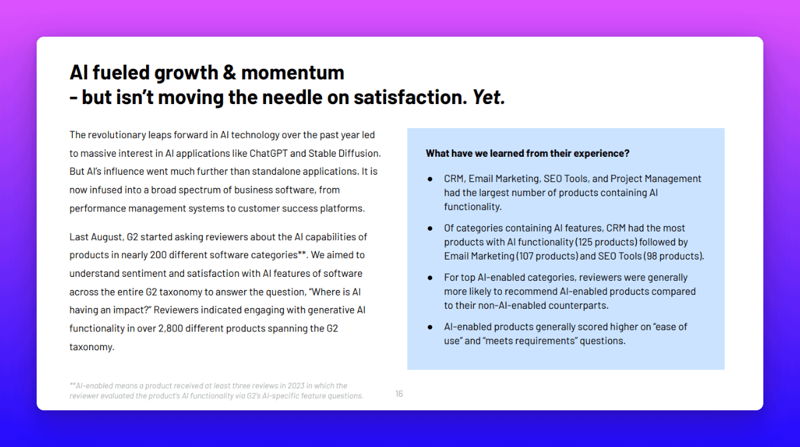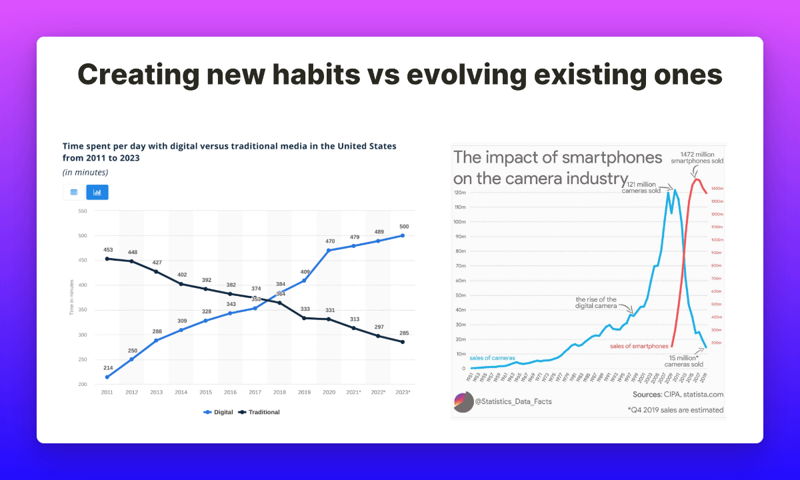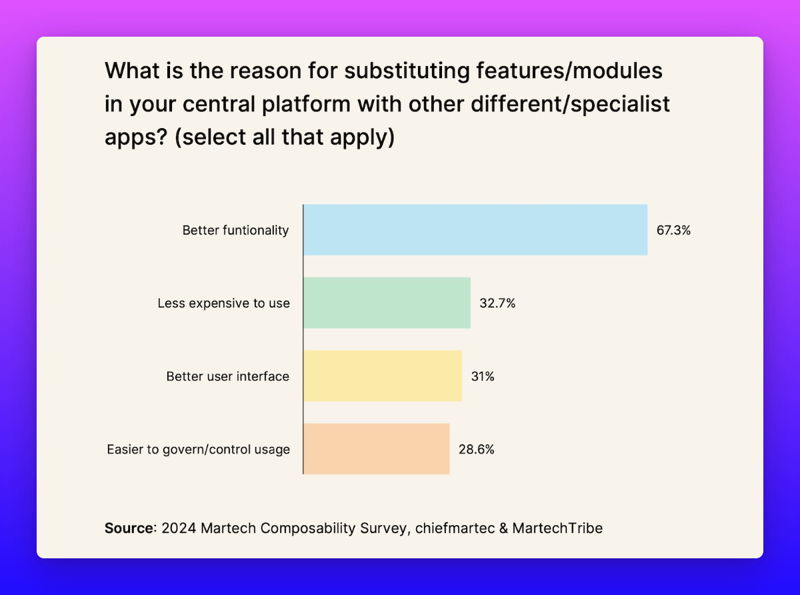Making Everything Better: The Seamless Integration of Apps, Integrations, and AI

G2 just released their May ‘24 State of Software report, and it includes some fantastic nuggets on the momentum of AI adoption. It revealed the number of new AI products grew an astonishing 44% year-over-year. Not super surprising - the recently launched State of Martech Report found the number of martech solutions grew at a 41.8% CAGR.

G2’s report uncovered something even more interesting - AI isn’t moving the needle on satisfaction. Yet.
“Yet” is an important caveat. AI, and the adoption of AI, is still nascent. I’m writing this in a Starbucks near my home and - looking at the screens around me - I don’t see a whole lot of AI. I see lots of locally installed apps like Microsoft Word and Excel, lots of manual copy/pasting, and people writing notes on physical notepads.
It’s harder to move the satisfaction needle if the adoption needle hasn’t moved all that much. A third of European businesses have adopted AI, a 32% growth rate in a year - but that still means two thirds of businesses are living in legacy-land.
Fear, patience, habits

In the US, time spent per day on digital media overtook time spent per day on traditional media in 2018. Wait, 2018? If you’re a technology nerd like me, that’s a decade longer than you would have expected. Why? Because new habits take time to form. Changing habits induces a fear of the unknown.
For software buyers, AI fear can manifest in a bunch of different ways, like:
- If I use ChatGPT to write blog posts for me, will Google penalize my website out of existence?
- If I use OpenAI to ask questions of my data, will the answers magically appear in a response to another user?
- If I use GitHub Copilot, and accidentally include API keys in my code, could I invite a security breach?
- If I buy into AI too much, could I… do myself out of a job?
AI startups are investing heavily in privacy and moderation tools to assuage these fears, but still - habits are habits, fears are fears. For builders of these new technologies, patience is required.
There are positive signals from software buyers that overcame their fears and evolved their habits. For top AI-enabled categories, G2 reviewers were generally more likely to recommend AI-enabled products compared to their non-AI-enabled counterparts. And AI-enabled products generally scored higher on “ease of use” and “meets requirements” questions.
So, net-net, a sprinkling of AI makes everything better. Which, of course, brings us to the title of this post.
App Partners make everything better, too
The best-performing App Partners share core, common traits. The apps and integrations they build are usually crafted to an extremely high standard. Integrations eliminate work-work and deeply integrate data and workflows. “Built for Platform” apps like solve clear customer problems incredibly well. They make everything better.
As a result - for the highest quality, best managed apps - five star App Marketplace reviews are the norm. Five star reviews eliminate fear for potential buyers, encouraging them to create new habits around the software you hope to sell to them. They make the process of selling to these new customers better.
For Platforms and Marketplace owners “making everything better” can be quantified in a variety of ways. Atlassian is a perfect example.
Beyond a 15-25% rake, product partnerships create other types of value for Atlassian. The existence of a broad set of apps and integrations in Atlassian’s App Marketplace helps Atlassian close new customers, faster. Through Atlassian’s marketplace, buyers can quickly understand if Atlassian integrates with the products and services they already use. They eliminate fear.
The SaaS business is a habit business
Apps and integrations created by product partners help Atlassian’s customers “future proof” the purchasing decision they’re about to make. Buyers can also quickly understand if they can “grow into” - and form habits around - Atlassian over time.

Apps and integrations also tend to offer better functionality than Platforms they integrate with. It’s the main reason customers substitute features/modules in central platforms with different/specialist apps - aggregating existing habits in favour of the Platform, which helps customers form new, longer-lived habits overall.
As a result, integrations keep activity high, which can ward off churn risk. The SaaS business is a habit business. If customers can’t quickly build daily and weekly habits around products and platforms, they churn faster. Apps and integrations help form strong habits which - for partners, platforms, and customers - make everything better.
The emergence and growth of new AI products - combined with a growing number of API-enabled products - sets App Marketplaces up for a new decade of growth. Composable stacks, effectively “bundles” of apps, integrations, and AI capabilities, will further reinforce the importance of interconnected Platforms and well managed marketplaces.
A growing choice of marketplace-distributed apps, integrations, and AI are set to make everything better for platforms, partners, and - most importantly - customers.
